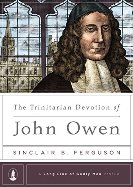One of John Owen’s many famous contributions to theology is his insightful and wonderfully pastoral work, Communion with God the Trinity. And if you have heard Sinclair Ferguson very often you have probably heard him speak of his deep appreciation for this Puritan giant. As he mentioned here in a previous interview, Ferguson has recently written to introduce Owen and his rich Trinitarian theology to a new generation. We have long appreciated Ferguson’s fellowship and faithful ministry, and we are pleased to have him with us today (and tomorrow!) to talk about his subject and new book.
Books At a Glance (Fred Zaspel):
First, for some who may not yet be acquainted with him, tell us something about John Owen. Who was he, and how is he significant?
 Ferguson:
Ferguson:
Amazingly until the Banner of Truth began reprinting Owen’s Works in the 1960s very few Christians had ever heard of him. Thankfully his name is much better known today – thankfully, because he may well have been the greatest English theologian (of Welsh descent!) since the Reformation – certainly in terms of his ability to operate at a high intellectual level and also at a deep heart level. His dates are 1616-1683. He studied at Oxford University, became a minister in the Church of England, which he with others wanted to see further reformed and purified (hence “Puritans”). He served two churches and in his early thirties came to prominence, so much so that the day after the execution of Charles 1, in January1649, he was one of the two ministers who preached to the English Parliament. Quite a burden when you are still thirty two! (The sermon is fascinating, not least because he doesn’t directly mention the stunning events of the preceding day).
When Oliver Cromwell became the Lord Protector, he appointed Owen Dean of Christ Church in Oxford University and then University Vice-Chancellor (the British equivalent of the American university President). He later fell out of favour because he opposed the idea of Cromwell becoming King (and was instrumental in communicating his and others’ concerns to Cromwell).
After the Restoration of the Monarchy and the Great Ejection (1662) Owen shared the lot of many of his fellow “Puritans,” refused to conform, and became an Independent. He didn’t suffer to the same degree as some of his brethren did (for whom he had a real practical concern). For one thing he was financially secure, and for another the State valued his ongoing usefulness! Towards the end of his life he pastored a congregation in London. He was (I think) a kind of presbyterian-congregationalist, a very learned biblical exegete, a profound systematic theologian, and a master heart-analyst. His works take up twenty four volumes of around six hundred pages each, so there is plenty of evidence for this claim!
Books At a Glance:
This book reflects your long-standing acquaintance with the works of Owen. Tell us how that came about. How did you first become acquainted with John Owen’s writings, and how did your interest grow?
Ferguson:
Well, I am a child of the sixties in the sense that I was born in 1948 and so was a teenager through the decade that so impacted our culture. In God’s providence it was just at that time that Owen’s works were being reprinted. I was a young University student. Owen was on sale for the equivalent of one dollar and fifteen cents per volume! (That doesn’t count inflation since 1966!!). I cannot now remember exactly why I started buying them. They looked important, were massive, and I could afford them! And of course J.I. Packer’s introduction to the single volume of Owen’s Death of Death had drawn attention to just how important Owen’s writings were. I began to read for myself and realised that here was somebody who could teach me profound biblical theology, get inside my heart with his spiritual analysis, and help me to become a minister of the gospel, which is what I wanted to be. So that was how it all started.
Books At a Glance:
Among Owen’s many works, do you have a personal favorite … or two?
Ferguson:
I do have a few favorites. I suppose because of its polemical nature The Death of Death became a book everyone was supposed to read (helps you spot an Arminian a mile away and slay him, or her, from three miles!), and his Mortification of Sin reminded me of an old UK advert for a household cleanser (“reaches the parts other cleansers don’t reach”)! So I probably read them quite early on. Each in its own way is a remarkable book. But Death of Death is a polemical work written by a young man, and Mortification is really more a record of some sermons he preached to (mainly) students at Oxford and while a very powerful book it needs to be set in a bigger context. I think it was when I realised what that “bigger context” was for Owen that I really began to love his writings and see how those other books fitted in to the whole gospel. Two works in particular were seminal here for me. The first is actually the last book he himself worked on, The Glory of Christ (the title says it all), and the other is his book on Communion with God the Trinity which is essentially a rich exposition of what it means to know God. Those two are still my favorites.
 Books At a Glance:
Books At a Glance:
This book, The Trinitarian Devotion of John Owen, reflects Owen’s more extensive treatment of the subject in his Works. Tell us something of the significance of Owen’s work. What contribution does he make?
Ferguson:
Well, I don’t want to spoil my book (in case anyone actually reads it!) or Owen’s book that I mentioned earlier. But perhaps I can put it like this. A dentist I knew once told me that he thought most of his patients brushed their teeth as though they were a single block of ivory, instead of paying attention to them one by one. (Of course a dentist would know how to make teeth-brushing much more interesting!). That is a trivial illustration, but I think there is something of an analogy in the Christian life. We think of “fellowship with God” but stop short of what it means to have communion with him in relation to each person of the Trinity and to all the persons as they relate both to each other and to ourselves. When we begin to explore this it opens up a whole new universe for us and leads to an enrichment of our ability to admire, love, adore and worship the Lord. So it is a wonderful remedy for the common theological and spiritual sickness that the Trinity is the most speculative and the least practical of all Christian doctrines. If you think about it, it seems that very few “worship songs” written today abound in adoration because God is Trinity.
Books At a Glance:
Owen emphasizes that the external works of the Trinity are indivisible – that when God acts, he always acts as God the Trinity. He also emphasizes the diversity of role and functions among the Father, Son, and Spirit. Help us put this together – how can a given act of, say, the Son, be a Trinitarian act also?
Ferguson:
Maybe the simplest way to answer is by giving one illustration….
Editor’s Note:
We will continue our interview with Dr. Ferguson here tomorrow.

